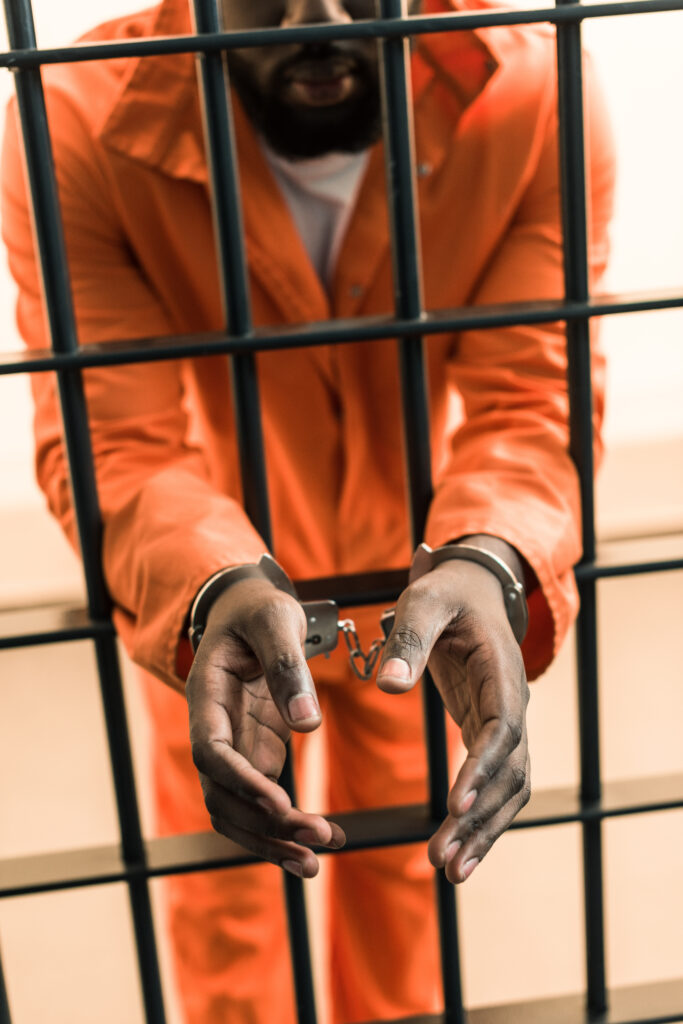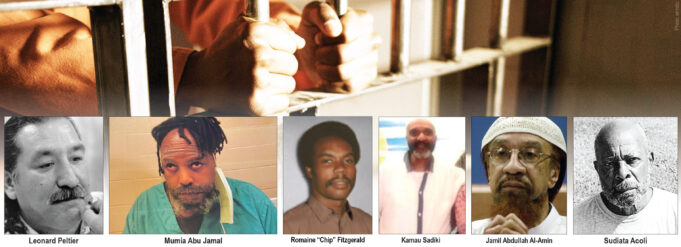
In the United States, the fight for justice continues to be a pressing issue, as highlighted by the plight of political prisoners. In 2023 their stories continued to garner attention and shed light on the systemic injustices they face within the criminal justice system. From wrongful convictions to excessively long sentences, these individuals have become victims of a broken system that disproportionately targets and punishes.
Despite the tireless efforts of activists, lawyers, and communities, U.S. political prisoners continue to languish behind bars, their voices often silenced by a society that is reluctant to confront its deep-rooted prejudices.
Black political prisoners have a long and storied history in the U.S. People have been imprisoned for their activism and fight for equality since before the civil rights era. Political prisoners have often been targeted by the government and the criminal justice system.
The legacy of Black political imprisonment began at the start of the 20th century, when Marcus Garvey, founder of the Universal Negro Improvement Association, was targeted by the U.S. government. Despite his efforts to empower Black people, Mr. Garvey was unjustly charged with mail fraud, imprisoned, and eventually deported in 1930.
The Most Honorable Elijah Muhammad, the Eternal Leader of the Nation of Islam, was detained in 1942 on false charges of failing to register for the draft even though he was older than the required age. His time behind bars had a significant impact on the prison industrial complex by paving the way for the growth of Islam within its walls.
Today, many political prisoners continue languishing behind bars or living in exile like Assata Shakur. Mumia Abu-Jamal, Native American activist Leonard Peltier, Imam Jamil Al-Amin (formerly H. Rap Brown) and many more are still behind bars. Others, finally released after decades behind bars and often elderly and in bad health, died shortly after coming home.
“Advocacy for our leaders is not sufficient. People are becoming more aware, but there is a concerted effort to paint figures like Dr. Matula Shakur as radical subversives trying to overthrow the establishment. We must recognize that Matula Shakur is a doctor, not just a rebel,” community activist Bigga Dre told The Final Call.
“This negative image makes it difficult for people to support him and others like Mumia Abu Jamal. They destroy their image to prevent mobilization and support for our leaders.
They did the same thing with the Honorable Elijah Muhammad, focusing on his personal life instead of his important work. We must not forget that these leaders came from the streets and fought for the betterment of our people,” he said.
“Furthermore, it is essential to address the plight of political prisoners in our country. Dr. Matula Shakur’s case and the ongoing challenges Imam Jamil El-Amin face, highlight the common factors among these leaders—they are melanated leaders fighting for the liberation of our people,” Bigga Dre added.
“Life sentences, which are effectively death sentences, are given to them in prison because they are denied proper medical care and support. It shows how they are treated as property rather than human beings, as they are only released when they are no longer a liability to the institution. These leaders are not only fighting for their freedom but also fighting for their lives. The injustice and mistreatment they face is a pressing issue that cannot be ignored,” Bigga Dre said.

The Jericho Movement is a leading organization committed to advocating for justice for political prisoners, originated from a call for a national march on the White House in the spring of 1998 by political prisoner Jalil Muntaqim. This call was initially made in October 1996 through the Provisional Government–Republic of New Afrika and the New Afrikan Liberation Front.
In a detailed interview with The Final Call, Jihad Abdulmumit, Chairperson of the National Jericho Movement, reflected on 2023 and the plight of political prisoners.
“As an organization, we have successfully maintained momentum in pursuing the mission and vision of the National Jericho Movement: to bring attention to political prisoners in the United States. While there is still much work to be done, our efforts have raised awareness and advocated for these individuals’ liberation and freedom,” Mr. Abdulmumit said.
“It is important to note that the overall mission remains crucial despite individual successes. The United States government and the prevailing narrative have sought to discredit the existence of political prisoners, making our ongoing momentum all the more significant. We have also prioritized nurturing relationships with like-minded organizations, community groups, and initiatives that address political prisoner issues,” he added.
“However, we do face challenges along the way. Sadly, we recently lost one of the Omaha Two, a political prisoner named Ed Poindexter, who passed away in prison this month (Dec. 7). Though we have not been able to secure the release of every incarcerated individual, we remain steadfast in our belief that Allah (God) is in control of all things. It is disheartening to witness the falsely accused endure decades behind bars. Still, we will continue to strive for justice and change.”
“We have successfully maintained momentum in our mission to address the issue of political prisoners. Despite individual successes, the United States government has been successful in spreading the narrative that there are no political prisoners. However, we are determined to challenge this status quo. Our ongoing efforts include building and nurturing relationships with like-minded organizations and community initiatives,” he pointed out.
“Our team was successful in securing Ruchell Magee’s release in July 2023, who had been incarcerated since the 1970 Marine County Court courthouse shootout. Tragically, he passed away shortly after gaining his freedom. The release of Dr. Shukar this year was a tremendous achievement. However, he passed away shortly after his release in July. As I sit here in Atlanta, Georgia, I can’t help but reflect on the importance of honoring the memory of all fallen heroes. Their legacy serves as a powerful motivation for us all,” Mr. Abdulmumit added.
He stated that it is puzzling why society is reluctant to let older individuals, who have served their time, go free. The problem lies in their desire to extinguish not only their physical existence but also their impact and inspiration, explained Mr. Abdulmumit.
“They want to avoid igniting the fire of change. But the Jericho Movement persists with its mission. We continue to fight for the release of our sisters and brothers in prison. This year, we have high hopes for Leonard Peltier’s victory at the federal level.
We also aim to secure the freedom of other state prisoners, such as Kamal Sidiki and Mumia Abu Jamal and advocate for Assata Shukur. We must raise awareness and bring attention to these important cases, including Jamil Al-Amin. The stories of these people deserve to be heard, and justice must prevail.”
Razakhan Shaheed is an activist who also advocates on behalf of political prisoners.
“I believe we haven’t been doing enough, you know? If I had a lawyer who advised us not to anger the judge, they would be gone. Our main goal was to win, to fight for victory. Although we’ve had some successes, it’s disheartening that Ed Poindexter, who was innocent, recently passed away after being locked up for almost 60 years. We must continue to advocate for change, even if there are obstacles in our way,” he said.
“Whenever a judge orders the institution to release someone, and they refuse, they violate a court order and become outlaws. As proud legal jailhouse lawyers, we fight to the death because we have no choice. We are not relying on individuals to do the right thing; we must force them to do so. But we have had some successes; we have managed to get a few brothers released. But usually, it’s just to let them come home to die,” said Mr. Shaheed.
“The shift in strategy to free our comrades in 2023 is clear, and while I may not have the perfect words to articulate it, I must mention that our movement has been unsuccessful in promoting the truth that there are political prisoners in the United States. We lack the power to demand their release. Additionally, our prisoners are aging,” said Mr. Abdulmumit.
He stated that because of this reality, the strategy has had to change. Instead of focusing solely on the release of political prisoners, the emphasis needs to be on factors such as their good behavior and contributions to the community while in jail including highlighting their excellent records and advocate for compassionate release due to their age.
“Some prisoners have specifically asked us not to mention their political prisoner status when appearing before the parole board. They want to be recognized for their good behavior and age. Our hope is that this approach will be effective in securing their release.
When considering how to get someone out of prison who is labeled a revolutionary and charged with a violent crime but is now older, traditional methods such as protests and rallies may not be the best solution. This is something we need to consider and explore alternative avenues deeply.”













